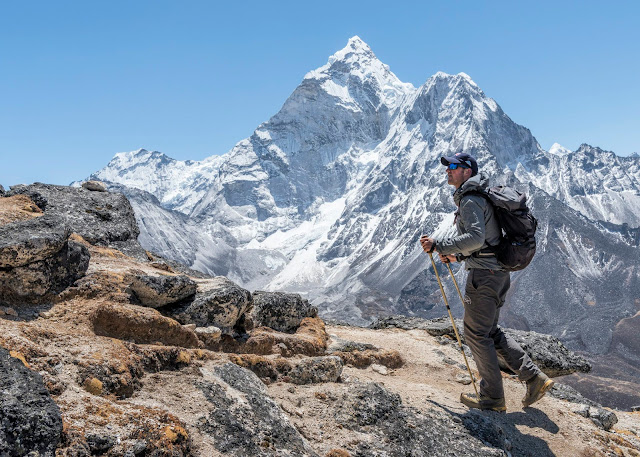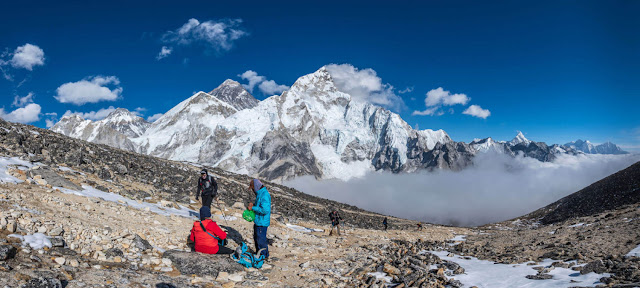Every trek costs a different amount of money. The exact trek costs can vary considerably depending on how you do the trek, how long you take, what transportation you use, which type of accommodation you choose (when there is a choice), and what trekking agency/guide you use.
As a rough guide, the Everest Base Camp Trek will cost you between USD 1,400 and 4,500.
Naturally, should you travel by helicopter to EBC, that will cost you around USD 1,000 per person on a shared base and USD 4,500 to charter the whole helicopter? And if you decide to go for the luxury lodges found in the lower reaches of the trek, this will also set you back a few hundred dollars more.
So that you can work out how much you can realistically expect to pay on this trek, we have put together this guide to the cost of doing the Everest Base Camp Trek.
Travel Insurance
Once you have decided on your trek and the trek dates, before you even leave home, you should arrange travel insurance. Why? It is essential to have insurance in case of an emergency during the trek. There may be delays, or you may require helicopter rescue services. Also, it is not possible to book this trek without insurance.
Cost: for 30-day insurance that covers trekking up to the altitude of 6,000m – USD150 to USD 200.
Nepal Visa
Everyone needs a visa to enter Nepal except for Indian nationals. The cost of the visa varies depending on the days you intend to stay in Nepal. For this trek, which is around 12-15 days, it is recommended to take a visa for a minimum of 30 days.
Cost: Multiple entry visas - USD 30 for 15 days, USD 50 for 30 days, and £125 for 90 days.
Trekking Permits
Each trekking region has the required permits for foreigners to enter the region for other purposes. For the EBC trek, you require two permits, which can be purchased in Kathmandu or at Monjo on the trail.
Cost: Sagarmatha National Park Entrance Permit at USD 30 per person, and Khumbhu Pasang Lhamu Gaupalika Permit at USD 20 per person.
Trekking Equipment and Gear
To have a comfortable trek, you need proper gear. You can get information from your trekking agency but let us give you the basics here. Each trekker must buy gear and equipment as they are not covered in the trek package. You should bring warm gloves, a sleeping bag, a raincoat, trekking boots/shoes, a water bottle, trekking poles, socks, a warm hat, a sun hat, and thermal underclothes. These are just the bare minimum. The cost will vary depending on the quality of the gear.
Cost: Around USD 200 to USD 500.
Transportation
While the start of some trekking routes will cost you very little to reach them, this isn’t one of them. Reaching the Everest Region is best done by flight. The other alternative involves long bus journeys and trekking for around 8 days to reach Lukla from Jiri. Since you are no doubt going to fly, you should calculate around:
Cost: USD 360 to USD 380 per person for the return flight.
Guide and Porters
On the EBC trek, it is not mandatory (yet) to have a guide and/or porter. But will make your trip safer, more fun, informative, and less burdensome. If a guide and porter are not included in your package (a guide should be so, please check), this is what you should expect to pay. Also, if you have not got a porter included, you might want to consider that as a porter will carry up to 20kgs – a lot more than you can.
Cost: a professional guide – USD 35 to USD 50 per day, including food, accommodation, and insurance.
Porter – USD 25 per day, including food, accommodation, and insurance.
Accommodation on the Trail
Accommodation can make or break your trek! There are a few luxury lodges, mid-range lodges, and cheaper teahouses on this trek. The majority of people opt for mid-range lodges or teahouses. Teahouses may be cheaper, but that doesn’t mean the standards are low. They can be great places to stay! Ask around and take recommendations.
Cost: a minimum of USD3 per person per night for a simple teahouse. Or for a twin share, USD 5 per room per night.
Some lodges are more expensive because of their location; for example, at Gorak Shep, it will cost you USD10 per person per night, and at Lobuche, USD 7 per person per night.
Extra Costs on the Trail as Required
Some people forget they are in the Himalayas when they enter their teahouse. Things are not as they are in the city – things are more basic, but that’s not to say they are uncomfortable. You will be required to pay extra for items we take for granted elsewhere.
Cost: hot shower – USD 2 to USD 6. Charging your electronics - USD 2 to USD10. Internet usage – USD 2 to USD 5 per hour. If there are electric blankets available, they will cost you between USD 18 to USD 20 per night.
Costs in Kathmandu
Your trek will start and end in Kathmandu, so you have to cover the cost of accommodation and any sightseeing you intend to do. Don’t forget to add food, drinks, taxis, and other miscellaneous expenses. Hotels range from USD 5 for something basic to over USD 200 if you go 5 stars. We recommend something around the USD 40 to USD 50 price range is good enough: usually 3 star.
Cost: all in all, accommodation, sightseeing, transport, and food will set you back around USD 60 to USD 120 per day in Kathmandu, depending on the accommodation and restaurants you choose.
Value Added Tax (VAT)
Unfortunately, trekking is not excluded from VAT. VAT is added to all goods, products, and services purchased in Nepal, as per the Government of Nepal.
Cost: the VAT rate in Nepal is 13%. You may also see service charges at 10% in many restaurants and cafes. This is an unavoidable cost too.
Individual Trekking v Package Trekking
Here are the approximate all-inclusive costs of the Everest Base Camp Trek if you do it through a trekking company or arrange it yourself and pay as you go.
Since booking the EBC trek through a trekking company is not mandatory, you can do this individually and pay the relevant costs yourself as you go. Here is a breakdown of what you should expect to pay for 12 days on this trek.
- With an international agency will total up to USD 4,700
- With a local agency, approximately USD 2,600
These prices include transport, guide and porter fees, accommodation, and food.
Going alone, the total cost of transport, food, and accommodation and hiring a guide and/or porter is given below:
- The total amount with one guide and a porter will cost you USD 1,370 for the whole trek
- The total amount with a guide will cost you USD 1,085 for the whole trek
- The total amount with a porter will cost you USD 930 for the whole trek
- Total among without a guide or a porter USD $ 645
To Sum Up
As you can see, it's considerably less expensive if you go alone, with no guide or porter. But there are a lot of downsides. Safety comes top of that downside list, so we do not recommend doing any trek alone.
FOLLOW MY ADVENTURES ON YOUTUBE @PinoyAdventurista
Thank You For Sharing! |





Hi! thanks for this very useful blog. What insurance company did you use? thanks
ReplyDelete